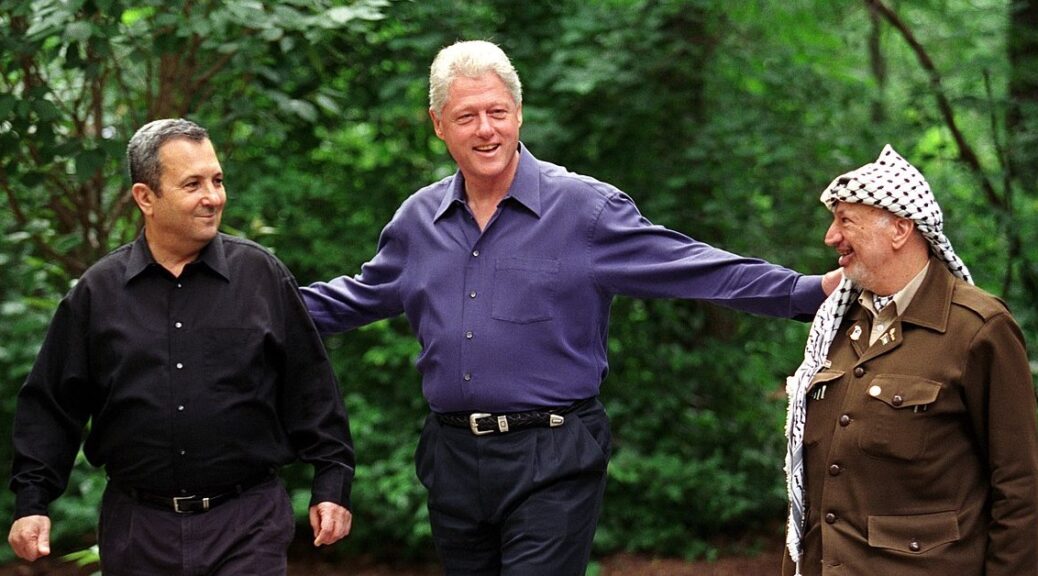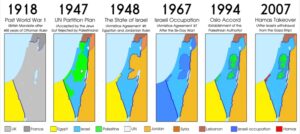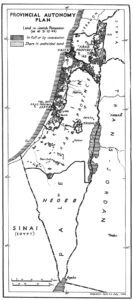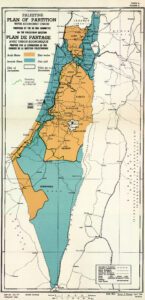
Churchill, Palestine and the State of Israel, Part 2: 1945-1951
Continued from Part 1: Remarks to Churchillians by the Bay, Richmond California, 10 February 2024. This text lacks endnotes. For these, see my two Timelines on Palestine and the State of Israel for the Hillsdale College Churchill Project: Part 1 (1945-46) and Part 2 (1947-49). Another version appears in The Amercan Spectator.

1945: Churchill out, Labour in
Churchill’s responsibility for the Palestine Mandate ended with the Labour Party landslide victory in July 1945. The new Foreign Secretary, Ernest Bevin, denied 100,000 Holocaust survivors entry into Palestine and rejected the idea of a Jewish state.
In early 1946, Jewish paramilitaries robbed a British payroll train and attacked RAF airfields. In April and May, Lebanon, Syria and Jordan achieved independence. On June 29th, the “Black Sabbath,” Britain arrested 800 Jews and confiscated arms caches in Jerusalem and Haifa. Retaliating, the paramilitary Irgun bombed Jerusalem’s King David Hotel, killing 91 Arabs, Jews and Britons.
An infuriated Stafford Cripps told Parliament that West Palestine had produced nothing but misery since 1922. Churchill retorted: “…it would hardly be possible to state the opposite of the truth more compendiously.” He called the years between the wars the “brightest most hopeful” West Palestine knew. Meanwhile, Britain had treated the Arabs “very well.” Iraq, Syria, Lebanon and Jordan (East Palestine) were all 100% Arab.
“Deep and bitter resentment”
Churchill then defended the Jews, whom the Labour government had ignored. The “months slipped by…. a deep and bitter resentment spread throughout the Jewish community…. He acknowledged, “the dark and deadly crimes [by] fanatical extremists…. It is quite clear, however, that this crude idea of letting all the Jews of Europe go into Palestine” was a mistake.
A Jewish MP, Sydney Silverman, interrupted. Should “any Jew who regarded a country in Europe as nothing but the graveyard and cemetery of all his relatives, friends and hopes be compelled to stay there if he did not want to do so?” Churchill replied:
I am against preventing Jews from doing anything which other people are allowed to do. I am against that, and I have the strongest abhorrence of the idea of anti-Semitic lines of prejudice. We have never sought or got anything out of Palestine. We have discharged a thankless, painful, costly, laborious, inconvenient task for more than a quarter of a century with a very great measure of success…. [It is] Great Britain alone, which has steadfastly carried that cause forward across a whole generation to its present actual position, and the Jews all over the world ought not to be in a hurry to forget that.
Sixth Two-State Solution

In 1946 Deputy Prime Minister Herbert Morrison and U.S. diplomat Henry Grady proposed the sixth Two-State Solution: an Anglo-American Trusteeship of West Palestine with autonomous Arab and Jewish areas. The boundaries were similar to prewar schemes. The Jewish Agency, by now determined on a State of Israel, rejected it. Now President Truman became frustrated. He wrote in his diary:
The Jews, I find, are very, very selfish. They care not how many Estonians, Latvians, Finns, Poles, Yugoslavs or Greeks get murdered or mistreated as Displaced Persons, as long as the Jews get special treatment. Yet when they have power, physical, financial or political, neither Hitler nor Stalin has anything on them for cruelty or mistreatment to the underdog.
Quoting this, the fair-minded Martin Gilbert added: “Truman’s cruel comments were not limited to Jews. ‘Put an underdog on top,’ he wrote in his diary, ‘and it makes no difference whether his name is Russian, Jewish, Negro, Management, Labor, Mormon, Baptist, he goes haywire. I’ve found very, very few who remember their past condition when prosperity comes.’”
Churchill blasted the Labour government, which had also rejected Morrison-Grady:
This absence of any policy or decision on these matters…has allowed havoc and hatred to flare and run rife throughout Palestine… [N]o one knows where we are today….
[I]f we cannot fulfil our promises to the Zionists, we should without delay place our Mandate for Palestine at the feet of the United Nations, and give due notice of our impending evacuation of that country…..
To have a war with the Jews in order to give Palestine to the Arabs amid the execration of the world, appears to carry incongruity of thought and policy to levels which have rarely been attained in human history.
Toward a State of Israel

Violence mounted in 1947. In February Ernest Bevin announced that Britain would hand its Mandate to the United Nations and evacuate West Palestine on 15 May 1948. The fixed date was as bad a mistake as the fixed date set for leaving India. All the contending sides had to do now was arm and wait. Churchill reacted in March:
£82 million since the Socialist Government came into power squandered in Palestine, and 100,000 Englishmen now kept away from their homes and work, for the sake of a senseless squalid war with the Jews in order to give Palestine to the Arabs, or God knows who.
‘Scuttle,’ everywhere, is the order of the day—Egypt, India, Burma. One thing at all costs we must preserve: the right to get ourselves world-mocked and world-hated over Palestine, at a cost of £82 million.
Seventh Two-State Solution
The United Nations, pressed by the pending British departure, now offered the seventh Two-State Solution—the most balanced yet. It awarded both sides equal coastlines on the Mediterranean, including Arab Gaza in the south and Arab Acre in the north. The Arab state, 99% Arab, would hold most of the West Bank and a substantial border with Sinai. The State of Israel, 55% Jewish, would include most of the Negev and the Red Sea port of Akaba, as Churchill had hoped. Jerusalem, with equal numbers of Arabs and Jews, would be a UN-administered international city. An economic union would enable commerce between the three.
On November 29th the UN General Assembly adopted the Plan 33-13. The United States and Soviet Union voted yes, nine Arab or Muslim states voted no, while Britain abstained. The next day, Churchill’s birthday, the Jewish Agency accepted.
The Arab League rejected the plan, claiming it left half of West Palestine to a State of Israel with only a third of the total population. (Ironically, at the Camp David Summit in 2000, the Palestinian delegation said they would be happy with 22% of the land.)
By early 1948, West Palestine was aflame. On May 14th Britain ended its West Palestine Mandate and David Ben-Gurion declared the independent State of Israel. The next day, Iraq, Egypt, Jordan and Syria invaded. To the Arab League, Azzam Pasha declared, “We will sweep them [the Jews] into the sea.”
War and aftermath

We lack time to recount the ups and downs of that war. You can find them on the Hillsdale Timelines. The State of Israel absorbed Acre, Jordan the West Bank & East Jerusalem, while Gaza went to Egypt. That lasted until the 1967 Six-Day War, when Israel occupied the West Bank and Gaza. Israel evacuated Gaza in 2006, the Gazans voted for Hamas, and the rest is history.
Some 711,000 Arabs left West Palestine. That’s a big number—but there were bigger numbers. To put this into perspective, consider the historian Andrew Roberts, reporting on the late 1940s:
In India, 16 million Sikhs, Muslims and Hindus left their homes taking only what they could carry. Over 800,000 Jews from Arabia, who’d lived there for centuries, departed. Crimean Tatars, Chechens, Ingush and Balkars were all ‘relocated’ (as Stalin called it). Newcomers ejected the Japanese and Korean Kuril and Sakhalin islanders and Italians of Istria. Three million ethnic Germans left Silesia and the Sudetenland. More recent were the Greeks of Turkey and Cyprus and the Vietnamese boat people.
Many of these refugees built new lives and a higher standard of living than in the lands they left. None are today actively demanding the right to murder people who have now lived in their former lands for over seven decades. The sole exception is Palestinian Arabs, whose leaders again and again chose to embrace fanatical irredentism and recurrent intifadas regardless of the interests of their people. The rubble seen in Gaza today is all they have to show for it.
The end of Britain’s role
Britain, which had military agreements with Egypt and Jordan, nearly went to war with the State of Israel during 1948. When London finally recognized Israel in January 1949, Churchill was magnanimous. “[T]he coming into being of a Jewish State in Palestine,” he said. “is an event in world history to be viewed in the perspective, not of a generation or a century, but in the perspective of a thousand two thousand or even three thousand years.”
But he was deeply critical of the postwar Labour Government. His daughter Mary always mocked claims that he was a manic depressive. She once said to me, “The things he went through would depress anybody.” Certainly West Palestine was one of those.
In mid-1946 Churchill had told the Government that if they could not solve the problem they should turn it over to the UN. It took them two years to do that, and a war resulted. He thought he could have done better:
We had the power and the chance to impose and enforce—I must use that word—a partition settlement in Palestine by which the Jews would have secured the National Home [while taking] into account the legitimate rights of the Arabs….
I always had in my mind…an Arab Confederation, comprising three or four Arab States…however grouped…and one Jewish State…which would have given peace and unity throughout the whole vast scene.
Churchill’s verdict
“The idea that only a limited number of people can live in a country is a profound illusion,” Churchill went on. “It all depends on their cooperative and inventive power. There are more people today living twenty storeys above the ground in New York than were living on the ground in New York 100 years ago. There is no limit to the ingenuity of man if it is properly and vigorously applied under conditions of peace and justice.”
Alas, peace and justice were not to be. Churchill returned power in 1951, too late to affect anything. He could only reflect sadly on the mistakes of the past:
The decline of our influence and power throughout the Middle East is due to several causes. First, the loss of our Oriental Empire and of the well-placed and formidable of the Imperial armies in India.
Second, it is due to the impression which has become widespread throughout the Middle East that Great Britain has only to be pressed sufficiently by one method or another to abandon her rights or interests in that, or indeed any other, part of the world.
A third cause is the mistakes and miscalculations in policy which led to the winding up of our affairs in Palestine in such a way as to earn almost in equal degree the hatred of the Arabs and the Jews.
Q&A: Why the two kings?
Why in 1921 did the Cairo Conference put foreign kings in charge of Iraq and Jordan? David Fromkin offered the best reply I’ve heard:
Because, in the world in which Churchill grew up, that’s what you did. When it was decided, just before the First World War, to create an independent state of Albania, an intrinsic part of the thing was to find it a king. In the Middle East in 1921, the same thinking applied.
Remember, the Ottoman Empire had no nationality. It was a Turkish-speaking Muslim empire. It was very difficult to establish ethnicity and loyalty since it was only based on religion. Thus, any Muslim government was pretty much acceptable to people of the area.
The Hashemites were brothers, but very different. Abdullah was part of the problem, so they made him part of the solution. He was already in Jordan. He had armed followers. For all the British knew, he might upset their tenuous rule.
It’s like deputizing a thief to sheriff because there aren’t any other deputies. It was logical to ask Abdullah to take charge—temporarily, they thought.” And as we now know, his descendant rules as King of Jordan today.
The King of Iraq was Faisal. Lawrence and Gertrude Bell were fond of him, and the British felt they owed him something. Faisal had fought the Turks.
It seemed like a very neat solution. By the way, they immediately repented of it. Faisal, once in office, became a nationalist. and Churchill feared that Faisal had betrayed them.
Q&A: The Churchill solution?
What would Churchill do? We cannot speculate. He is not here to speak. He last spoke on this topic in 1958, after the deposition and execution of Faisal II in Iraq. Is there something here?
The Middle East is one of the hardest-hearted areas in the world. It has always been fought over, and peace has only reigned when a major power has established firm influence and shown that it would maintain its will.
Your friends must be supported with every vigour and if necessary they must be avenged. Force, or perhaps force and bribery, are the only things that will be respected.
It is very sad, but we had all better recognise it. At present our friendship is not valued, and our enmity is not feared.
Surely it is clear that the eight Two-State Solutions that have never satisfied the sides. What about a Three-State Solution? Gaza to Egypt, West Bank to Jordan—the 1967 borders before that Arab-Israeli war?
People will say, “But Egypt and Jordan don’t want them back!” That’s where Churchill’s idea comes in: force and bribery. The cost of bribery in lives and treasure is less than the cost of war. Back the deal with force through air power—and maybe Churchill was on to something.
Better yet, the words of a friend in a discussion on the woes of the British auto industry. “Go back to 1945 and start all over again.”
Further reading
“‘Jarring Gong’: Benjamin Netanyahu on Winston Churchill,” 2023.
“When Did Churchill Become a Zionist?,” 2022.
“Churchill at the Stroke of the Pen: Jordan and the Indian Army,” 2021.
“Churchill and Lawrence: Conjunction of Two Bright Stars,” 2020.
“Avaricious Imperialists or Nation Builders? The Middle East 100 Years On,” 2020.







One thought on “Churchill, Palestine and the State of Israel, Part 2: 1945-1951”
Thank you, Richard, for such a comprehensive history. I hope a government considers your (Winston’s) suggestion.
Comments are closed.